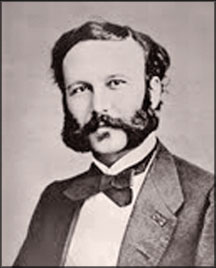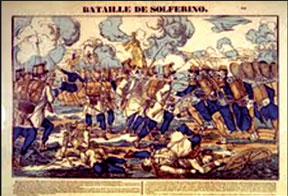ICRC -Caring, above the fray
Ishara JAYAWARDANE
‘Blessed are the peacemakers: for they shall be called children of
God’ (5:9) We live in a world of Violence and destruction. A world where
carnage reigns supreme. Every day we see on the news some form of
conflict. We live in a world of suffering and most times innocents have
to pay the price. However in all this mayhem the ICRC (International
committee of the Red Cross) has emerged as a powerful presence
intervening on behalf of those who love Peace in this world.
|

Henry Dunant |
It is going to be 150 years since the founding of the ICRC (
International Committee of Red Cross)which was celebrated last February
on the 17th . Next year it will be 25 years of ICRC in Sri Lanka.The
beginnings of the ICRC and what has now come to be known as the Red
Cross Movement, can be traced back to an initiative of Henry Dunant, a
Swiss businessman and philanthropist , who assisted wounded soldiers at
a huge military battle in a place called Solferino in Northern Italy in
1859.
Seeing the human suffering he decided that something had to be done.
This prompted him to lobby political leaders to take worldwide action to
systematically protect victims of armed conflicts. He pushed for the
creation of a neutral and impartial organization to protect and assist
the war wounded (the ICRC). He also suggested that voluntary relief
societies should be established to care for the injured – an idea that
would eventually lead to the formation of National Red Cross and Red
Crescent
Societies,” said Sarasi Wijeratne, Spokesperson, Press and
Information Officer..
In 1862, Dunant self-published a graphic account of the aftermath of
the battle, called A Memory of Solferino which he used as a campaigning
book for his crusade to achieve his goal. To form a neutral and
independent organization which would care for victims of conflict. This
was the Embryo of ICRC.

Dunant promoted the idea of National Societies. Most countries in the
world have their own red cross societies, like Sri Lanka has its Red
Cross society.
Today, the International Red Cross and Red Crescent Movement,
composed of the International Committee of the Red Cross (ICRC), the
International Federation of Red Cross and Red Crescent Societies and the
individual National Societies, has become the largest humanitarian
network in the world
The ICRC’s exclusively humanitarian mission is to protect the lives
and dignity of victims of armed conflict and other situations of
violence and to provide them with assistance. It directs and coordinates
the Movement’s international relief activities during armed conflicts.
Established in 1863, it is at the origin of the Movement. To meet the
evolving humanitarian challenges and constantly growing needs,the ICRC
became a “large” humanitarian organization with a presence in over 90
countries all over the world, and has a workforce of almost 13,000 men
and women of over 100 different nationalities.
The ICRC's humanitarian action in Sri Lanka
The ICRC has been working in Sri Lanka since 1989, cooperating with
the Sri Lanka Red Cross Society, first during the JVP insurgency in the
South, then during the conflict with the LTTE in the East and in the
North, seeking to contribute to the protection and assistance of persons
directly affected by the armed conflict that ended in 2009.
“During the conflict, the ICRC was actively involved in life-saving
humanitarian efforts and was responsible for distribution of
humanitarian supplies , the medical evacuation of nearly 14, 000 sick
and wounded people and transportation of dead bodies. Today, in light of
the current situation of peace and of the achievements of the relevant
authorities in the period of post-conflict recovery and rehabilitation,
the ICRC, through its work in Sri Lanka, aims to contribute to the
endeavours of
national institutions to address the outstanding needs of Sri Lankans
who continue to be affected by the direct consequences of the past
conflict, including detainees, their families and families of persons
unaccounted for. The ICRC also promotes essential humanitarian norms, in
accordance with national and international obligations of Sri Lanka
through Ministries, Sri Lanka Armed Forces, Police and Academics.”
Since 2009, the ICRC has substantively reduced and adapted its set-up
and modus operandi. With due regard to the milestones provided in the
recommendations of the LLRC Report, the Plan of Action of the government
for their implementation as well as the National Action Plan for the
Protection and Promotion of Human Rights (NAPHR), today, the ICRC works
with authorities, academics and students to further raise their
awareness on current international humanitarian law (IHL) matters.
In Sri Lanka, ICRC staff, in agreement with the authorities, have
been visiting places of detention since 1989. “The aim is to assist the
detaining authority to ensure that inmates treatment and material
conditions comply with internationally recognised norms and humanitarian
standards.Throughout the world, even after conflicts end, families
continue to search for their relatives who cannot be traced, coping
daily with prolonged uncertainty.
The ICRC has offered its services and expertise to the Government to
contribute to the implementation of the humanitarian recommendations
contained in the LLRC Report, in particular as regards the plight of the
families who have relatives unaccounted for following the past
conflict.”
The ICRC endeavours to ensure economic security for people affected
by the past conflict by supporting them to rebuild livelihoods through
micro-economic initiatives which aim to strengthen income generation in
households and entire communities in a sustainable manner and in a given
time frame. The projects are tailored to meet individual needs as
expressed by the recipients. The most commonly used micro-economic tools
are productive grants, vocational training and small loans.
The ICRC's main partner in Sri Lanka is the Sri Lanka Red Cross
Society (SLRCS), which, through its wide network of branches and
thousands of staff-members and volunteers, can rely on a capacity and
substantial potential for addressing humanitarian needs, in particular
of rural communities still coping with the effects of the past conflict.
Vulnerable households have received cash grants, livestock and access to
clean drinking water. |







